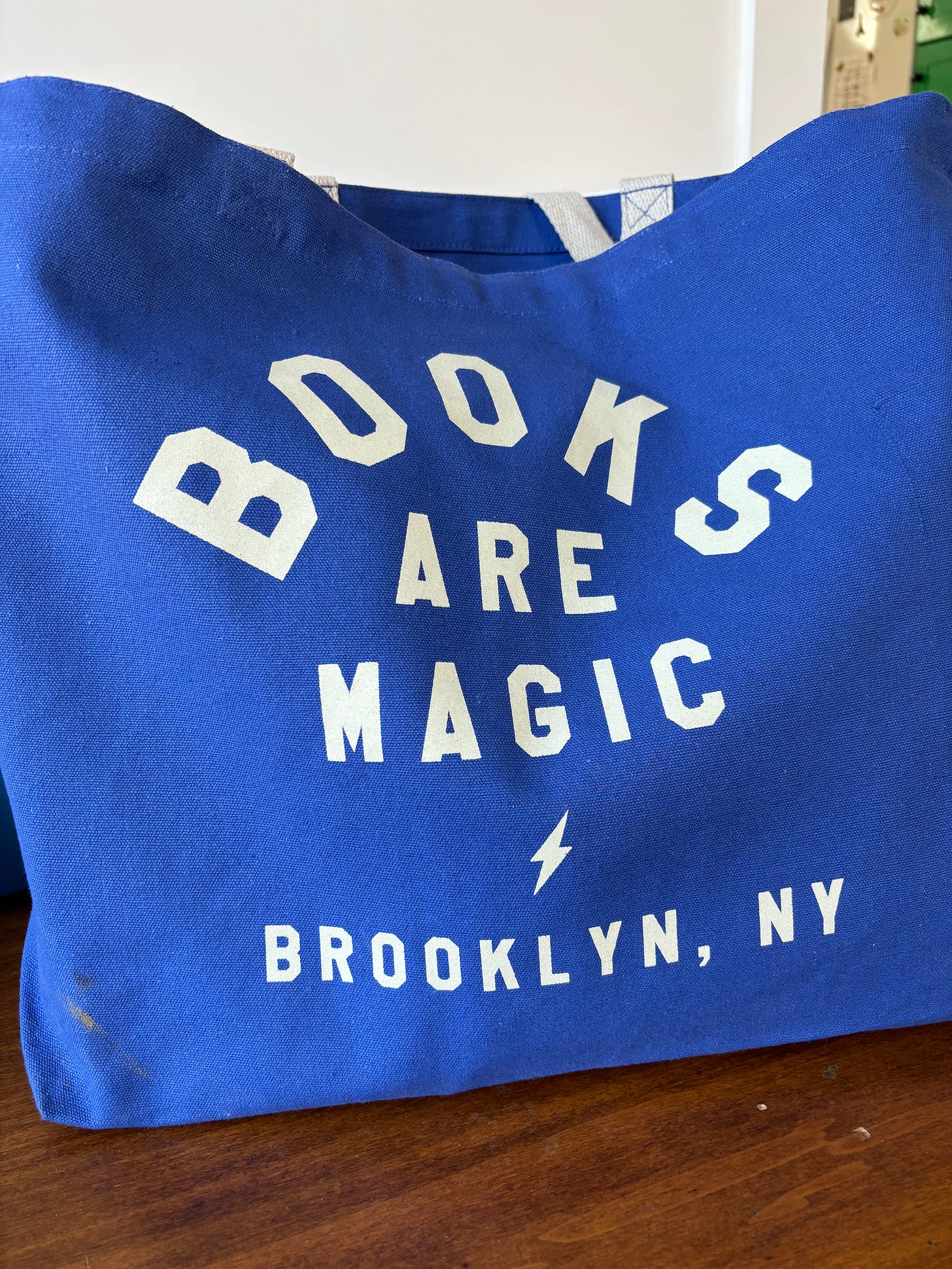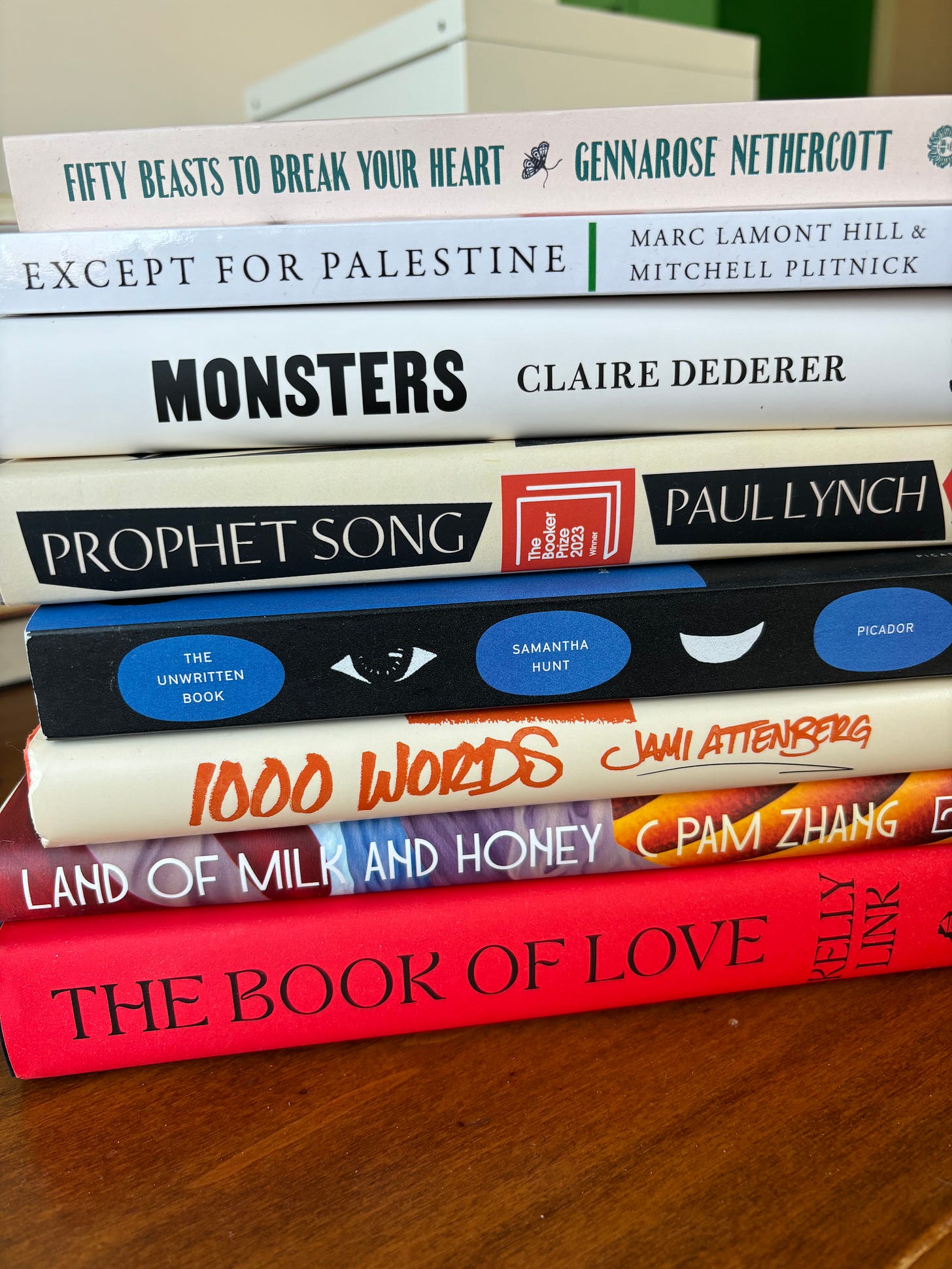I. Book lover
Here is a story my mother told. As a toddler, I never napped. She would place me in my crib with books and lie down for her own nap, and I would spend a happy hour turning the pages, wide awake. This from the time I was one or so.
I remember my mother reading to me, my father, too. I was read to so often that I memorized the text to Mother Goose, Richard Scarry, and I don’t know what else. Brown Bear Brown Bear for sure. Corduroy. Fairy tales—though I imagine I paraphrased them, as is proper. I would sit in a lap—my dad’s, my mom’s, my grandma’s—or by myself and, prompted by the illustrations, I would recite the words I knew by heart. I believed I was reading. When my mom tried to explain memorization, I protested: NO! I am reading.
One evening I sat on my dad’s lap and read Cinderella to him. I had a Chatty Cathy doll named Harold, and she was probably there, too. This time I was in fact reading the words, decoding them, rather than reciting from memory. I came to a word I didn’t know. Then, after a moment, it revealed itself to me: “hour.” That silent “h”! I hold the thrill to this day. I was three, maybe four.
In Grand Rapids we lived blocks from our neighborhood branch of the library, called the Yankee Clipper (why?), and I rode my silver Huffy ten-speed there to borrow and return books. I also spent two summers volunteering at that branch, starting in late elementary school. I covered paperbacks with contact paper precisely cut to fit the corners, and I shelved books. I checked out every book about magic tricks and how to create costumes and disguises from everyday objects. I wanted to be a magician, great like Houdini, or a spy, with my cousin Lisa.
In elementary school I learned to use a card catalog, and we were required to memorize the Dewey Decimal System, for the same reason, I think, that we were taught the metric system. Because that’s where we, as a nation, were heading: into the future, stripped clean of arcane systems like Library of Congress Classification, or arbitrary measures like the foot, the inch, the pound, the mile. There seemed to be a patriotism to it, as if we were still trying to shake off anything British-inflected and overly fussy.
When I got to middle school, my school building was downtown near the main branch of the public library. Most afternoons would find me at the library between the time when school let out and my dance lesson or acting class or play rehearsal. I would do my homework and hang out with friends before grabbing a muffin and heading to the theater. Thanks to the main branch of Grand Rapids Public Library, safely away from my neighborhood and the librarians who knew my mom, I read the books forbidden to me, like Forever and Flowers in The Attic.
Where does book love come from? My friend the writer Jennifer Savran Kelly was a bookbinder and a journal editor before they became a novelist (and they still work in publishing, as a production editor). I wish I had known earlier about bookbinding and letterpress as art and craft. I like to think I might have gone that route. I wish someone had said to me, you can have a career in books, not just in ideas (which I thought more lofty), and here are the ways. Because I have loved books from my beginning.
But despite not knowing about careers in books, I have worked humbly as a bookseller and a copyeditor and production editor. I have worked long stretches of my life in books. For a long time books felt like a hobby—even when I was getting paid. To embrace not only the content but the form, the physical object, and all the ways a life can be lived in books—this has taken me many, many years. To be unapologetic about my love . . . well, one’s fifties are a good time for those kinds of apologies to cease.
And the bookstores. The thrill I get on entering a well-curated, independent bookstore is like no other. Let me name as a litany the bookstores that have been dear to me in my life so far, in rough order. (All of these are or were independently owned bookstores—some were bought out or, in the case of Border’s, became a chain bookstore later, and suffered mightily for it, as far as I’m concerned. They were simply not the same bookstore anymore.)
Pooh’s Corner, Grand Rapids, MI (closed)
Schuler Books, Grand Rapids, MI
Books & Co., Dayton, OH
Border’s, Ann Arbor, MI (closed)
Shaman Drum, Ann Arbor, MI (closed)
Common Language, Ann Arbor, MI (closed)
The Globe, Prague
Three Lives & Co., New York City
My Sisters Words, Syracuse, NY (closed)
Literati, Ann Arbor, MI
Shakespeare & Co, Paris
Librairie Galignani, Paris
Buffalo Street Books, Ithaca, NY
Odyssey Books, Ithaca, NY
II. Books are magic
Last week was the schools’ midwinter break, and my family and I took the bus down to the city and spent a few days in Brooklyn. While the guys played video games and D&D, I made a pilgrimage to Books Are Magic.
The novelist Emma Straub and her husband Michael Fusco-Straub opened Books are Magic on Smith St., in Cobble Hill, in spring of 2017. (There is now a second location in Brooklyn Heights.) Emma writes delightfully in Literary Hub about her beloved neighborhood bookstore, BookCourt, where she once worked as a bookseller, and how its closing after 37 years prompted her to open her own bookstore.
Any long-standing retail establishment that sells culture is going to be staffed by a motley crew of opinionated weirdos, and BookCourt [was] no exception. . . . Anyone who chooses to work the front lines of a shop selling books is going to be both chatty and at least a little bit insane.
Emma is the daughter of the late horror writer and poet Peter Straub, originally from Wisconsin, whose mother wanted him to be a Lutheran minister. Somewhere there is a delightful essay by Emma about growing up in this weird family above St. Mark’s Bookshop (closed), in the East Village. I can’t find this piece now that I want it. And, she grew up in Brooklyn? And on the Upper West Side? Maybe I imagined it—the eccentric family in their city apartment, a bookstore on the ground floor. Maybe I dreamt it as my own. But I don’t think so.
Books Are Magic is, in fact, magical (though it is not an occult bookstore, as both my spouse and friend assumed from the name; it is a general-interest bookstore). It is not large (the is New York City real estate after all), but it is stuffed full with almost any recent or classic book an avid literary reader could want. I grabbed a basket and started filling it. I thought the forty-minute walk back to Park Slope would provide a natural limit to my book buying. It did not. I left a few books behind, trying, again, to limit myself. I regret it.
I bought signed copies of The Book of Love, Kelly Link’s long awaited novel, and 1000 Words by Jami Attenberg, based on her free, inspirational writing “boot camps,” #1000daysofsummer. I was delighted to find GennaRose Nethercott’s book of stories, Fifty Beast to Break Your Heart; her Thistlefoot is already one of my favorite books of 2024, and it was the first book I finished reading this year. Prophet Song by Paul Lynch, which won the Booker Prize last year, may be a book to take in small doses; I’ve heard it’s unrelenting in its depiction of an Ireland falling to fascism. I’ve already devoured Monsters, by the critic Claire Dederer, however; the essay on Abandoning Mothers is worth the price of the book, especially if you are a mother and an artist, or want to be.
My two discoveries, which I bought thanks to shelftalkers written by bookseller Bex (thank you, Bex, whoever you are!), are Land of Milk and Honey, by C. Pam Zhang, described on the inside flap as being about “seeking pleasure in a dying world”—which is exactly my kind of book (a sensuously written environmental dystopia about a chef)—and The Unwritten Book, by Samantha Hunt. I truly have no idea what that last book is, but it intrigued me, and Bex recommended it.
You all, I didn’t have to dig to find these books. They leapt at me from their tables and shelves. There are still depths of that bookstore to explore in subsequent visits. Magic, I’m telling you.
III. Read this book
If you read one book about antisemitism, make it the stunning People Love Dead Jews by Dara Horn. This was my subway and nighttime reading in NYC; I couldn’t put it down. And I can’t recommend it enough. Horn, the award-winning author of five novels, holds a Ph.D. in Hebrew and Yiddish literature from Harvard and has a vast knowledge, into nooks and crannies, of Jewish history. She is a wonderful storyteller, and she tells stories you’ve never heard before, probably even if you are Jewish (you can let me know). Her argument is that people love Jews when they are sanitized for general consumption, victimized, or dead, but not so much when they’re alive and moral agents and fully human and thriving. But the book is so much more than that: history, sanity, perspective, love. And really good stories.
I also highly recommend Horn’s article in the Atlantic, about antisemitism on elite university campuses, “Why the most educated people in America fall for anti-Semitic lies.”
And in case it needs to be said, and I fear it does: This is not about opposing freedom for the Palestinian people or being in favor of war. This is about antisemitism. Its poison harms us all.





Oh Sara! I was recently described by a friend as “a stack of books in a trenchcoat,” and while I would add “wearing lipstick and dyke glasses” to that, it’s basically true. This essay resonates with me so fully, down to the library stuff, except for me it would be that my father, newly having acquired a drivers license and a very used car, would drive me to different branches of the Toronto public library system one Saturday a month and I’d fill a duffel bag with books because I’d rad everything worth reading at our crappy neighborhood library. Also, I love Emma Straub’s novels and recommend them, really all/any of them! And also I have people love dead Jews on my tbr, but have had it there for months and may try to read it sooner because of your post!
Pauses reading to put a hold on Thistlefoot...